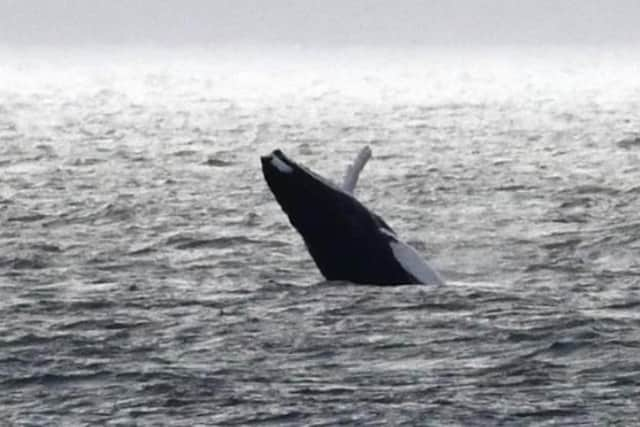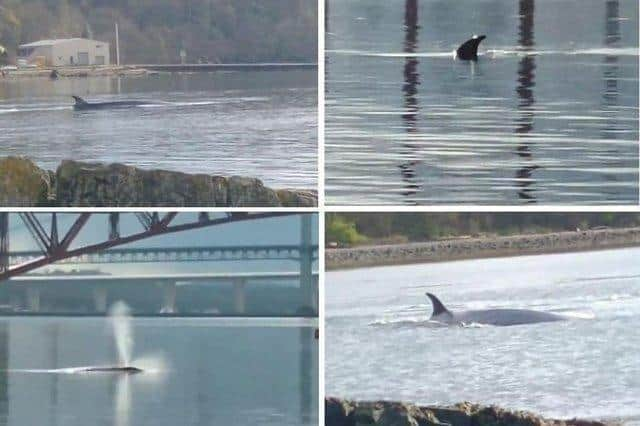Firth of Forth whales are a sign of recovering seabed
and live on Freeview channel 276
But the Wildlife Trusts warn marine nature is being disturbed by human activities around the coasts and climate change is disrupting wildlife from fish and crabs to Wally the walrus.
The coalition of regional charities’ marine review of the year shows that by early December, Cornwall Wildlife Trust had recorded 17 sightings of humpback whales, once an extremely rare sight in UK waters.
Advertisement
Hide AdAdvertisement
Hide AdOne humpback has spent weeks entertaining those lucky enough to catch a glimpse as it feeds in the Forth. Experts say it was malnourished but has now started gaining weight thanks to bountiful supplies of shrimp-like crustaceans – called krill - and small fish.


READ MORE: Firth of Forth humpback whale: Incredible drone footage captures huge whale coming up for air
It brings the total to 75 sightings since 2019, with the species thought to be chasing shoals of sardines now present in the region’s waters, and shows numbers are recovering after bans on commercial whaling.
In April, a Sei whale, a species rarely seen in Scotland, was arrived in the Forth and was only the ninth sighting in Scottish waters in 50 years.
It died in November after stranding on the shore at Dalgety Bay in Fife and many of its bones were recovered by the National Museums Scotland for a possible exhibition in Edinburgh.


Advertisement
Hide AdAdvertisement
Hide AdDaniele Clifford, marine conservation officer for The Wildlife Trusts, said: “Noise at sea caused by wind farms and other development can disorientate wildlife and cause whales and dolphins to head off course – we need to think carefully about all marine development in the future.
“Also, far too many marine creatures are unnecessarily killed due to unsustainable fishing practices, with lost and discarded fishing gear also causing havoc – especially for seals, dolphins and other marine mammals.”
The organisations also warned that people’s recreational activities are putting pressure on wildlife, with a rise in disturbance from jet-skis and motorboats causing major concern.
Climate change is also disrupting wildlife, with marine creatures from far-flung places turning up around the British coasts.
Advertisement
Hide AdAdvertisement
Hide AdAn Arctic walrus nicknamed Wally made a splash as his progress was tracked around the UK, while a second walrus was seen off Northumberland and around Shetland.
A pufferfish, found in the open ocean and rarely seen this far north, turned up on Downderry Beach in Cornwall, possibly blown off course by summer storms.
Lissa Batey, head of marine conservation for The Wildlife Trusts, said: “It’s been a fantastic year for marine megafauna sightings, particularly in the South West, but it’s clear that our oceans are under immense pressure from fishing, development, pollution, climate change and recreation.
“All these issues are having a huge impact on life at sea.”
She said protecting the marine environment was a critical part of limiting global temperature rises to 1.5C to prevent the most dangerous climate change because healthy seabed habitats store carbon.
Advertisement
Hide AdAdvertisement
Hide Ad“We need policies that stop unsustainable fishing practices and prevent unrestricted development at sea – and we must protect at least 30% of our oceans by 2030.”
Projects to restore nature and tackle climate change by the coalition of wildlife organisations include restoring sea grass habitats which are home to nature including seahorses and are responsible for around 15% of carbon absorbed by the oceans.
A message from the Editor:
Thank you for reading this article. We're more reliant on your support than ever as the shift in consumer habits brought about by coronavirus impacts our advertisers.
If you haven't already, please consider supporting our trusted, fact-checked journalism by taking out a digital subscription.
Comment Guidelines
National World encourages reader discussion on our stories. User feedback, insights and back-and-forth exchanges add a rich layer of context to reporting. Please review our Community Guidelines before commenting.